Are you looking to start a blog? Ready to dive into the world of blogging, but not sure where to begin?Believe me, I get it. Back when I started my first blog in 2004 I felt lost. There was no roadmap or getting started guide. I was blindly swatting at flies hoping to get it right.I wondered...
- what should I write about
- how do I find topic ideas, and
- what blog platform should I even use?
But times have changed. Today, starting a blog isn't time-consuming or difficult.And if you’re wondering if blogging is right for you, don’t worry!Blogging is for anyone interested in extending, launching, or reinventing a brand.If you want to build awareness and authority, read on for a step by step to starting a successful blog!
BONUS: Want to start your blog today? Watch my getting started guide to create your blog in a matter of minutes!
Disclaimer: Some of the links in this post are affiliate links which means that if you decide to buy, I will earn a commission. 3 things you need to know: I only recommend products I use within my own business, am extremely happy with, and can confidently promote.
How to Start a Successful Blog in 7 Easy Steps
STEP 1. Find Your Topic and Perfect Niche
A. Do Your Research
If you want to create a blog people flock to, you need to begin with research.Getting a clear understanding of what your blog is about, who you're writing for, and what type of content you create will make the "getting started part" a whole lot easier.To get an idea of what you're looking for within this research, let's imagine you’re a health and fitness blogger.You write about exercise, nutrition, weight management, and behavioral change.We're going to take those phrases and head over to Google Keyword Planner. Here you're searching for two things:
- Niche specific keyword options
- The competitiveness of those keywords
For example, take the phrase "weight management." When I add that in, here's what I see.
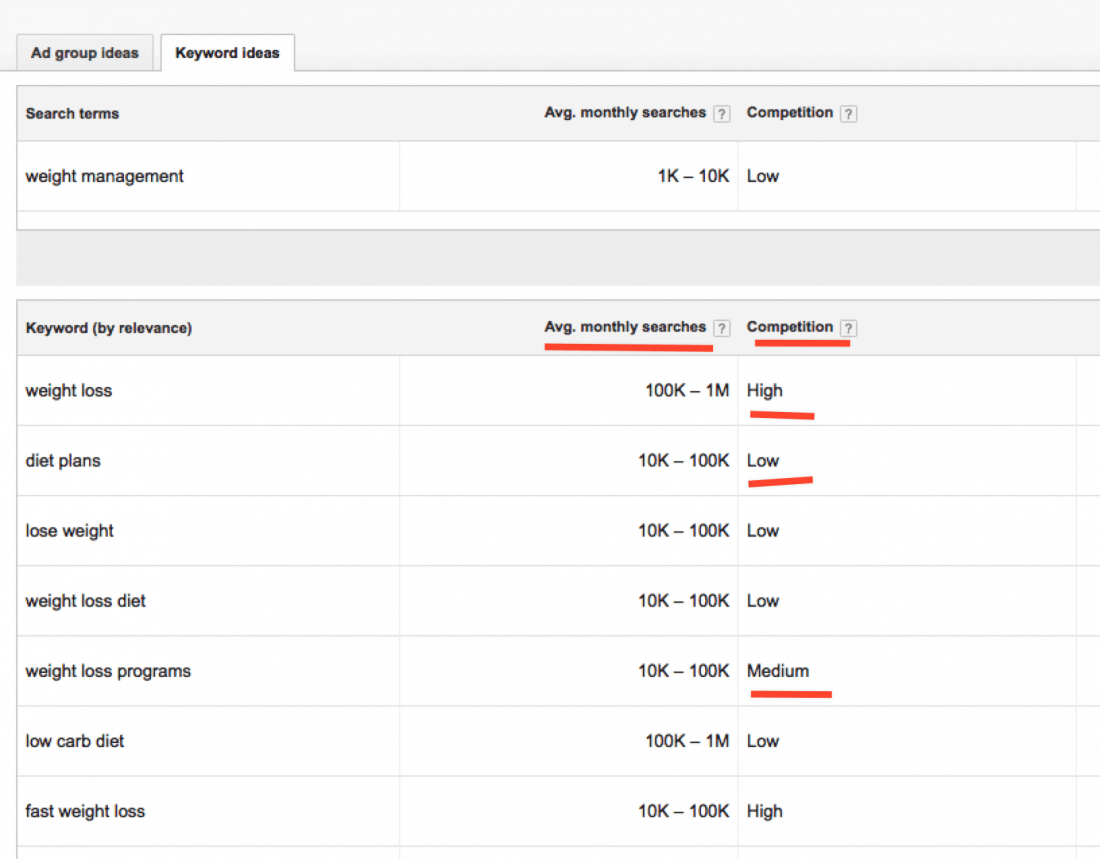
What you want to identify is the volume for that niche. No sense in tackling a niche if there's no one interested, right?Your next step is to look at what people (your target audience) are searching for.You want to know what words they're using and how they actually search. That's where Google predictive results come in.I’m sure you’ve seen this at work. As soon as you begin to type, Google will predict what you’re looking for.These predictive results are a great place to see what others are looking to know, learn, and better understand.
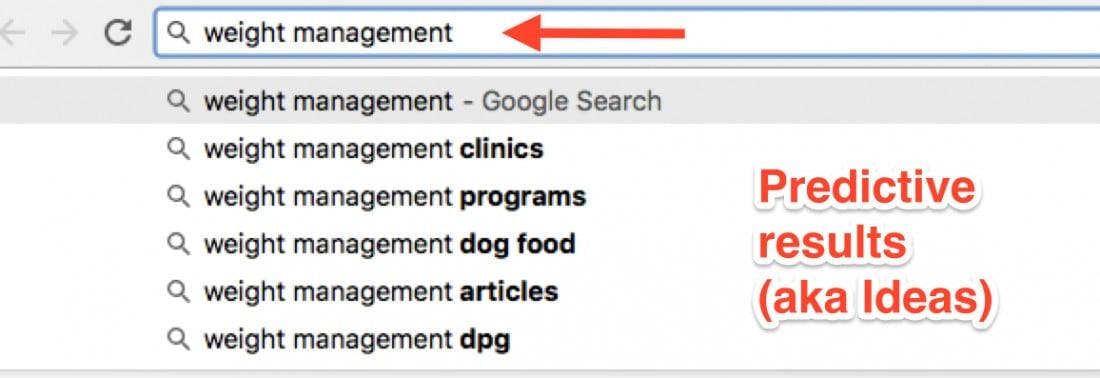
As Nichehacks.com suggests, the best niches are evergreen niches that already have:
- A proven track record
- High demand
- Lots of easy to find customers online
- Endless products on sale
- Lots of websites, social media groups and forums
- Competition
B. Know the Purpose of Your Blog
Have you determined what you want to get out of blogging? Start here before you begin your blog.What are you trying to achieve?
- Authority: create content around a singular focus or topic?
- Credibility: build a reputation within in your industry?
- Thought Leadership: drive market decisions by anticipating needs?
- Motivational: excite, inspire, and lead your audience?
- Legacy: design content that leaves an indelible mark on your industry, audience, and community?
C. Merge Passion with Profit
Tie your purpose with passion to create a viable blog. Find your passion by answering these questions:
- What top 5 topics would you write about if time and money weren’t a factor?
- What about those topics excites you?
- Can you put a new spin on that topic and make it unique?
- Can you clearly articulate a benefit around the topic?
- Is there an audience for your topic?
- Is it a sustainable topic?
- What topic could you write about over and over without it ever feeling stale?
D. Get to Know Your Niche
Successful bloggers know that understanding who you’re speaking with is the first key to success.You don't need to be an expert right out of the gate, but you do need to understand what your audience wants.To create a successful blog, here's 3 things you'll need:
- Actionable advice to solve everyday problems
- Proven methods that make your solution easier, better, and more justifiable than the competition
- A passion for that community (money will come when passion is the fuel that keeps your blogging fire lit!)
A Quick Recap
PURPOSE: What’s the purpose of your blog? Top options are:
- Authority
- Credibility
- Thought Leadership
- Motivational
- Legacy
PASSION: Write down 5 topics you'd write about if time and money weren’t a factor.ORIGINALITY: Share your original solutions to current market problems
STEP 2. Choose a Domain
Choosing your domain might feel like an afterthought, but it’s a crucial piece to your new blog.As you embark on this journey, let me share three important things for you to consider.You’ll take these answers and incorporate them with your keyword research into your domain name.
Tips for Your Domain Name
- Keep it short - Make it easy to remember, recite, and type with 2-3 words at the most.
- Keep it Relevant - Your domain must tell the story of who your company, industry, or niche is. Be very clear in what you do. And if you’re a local business, you might consider adding it to your domain. For example: A dentist in the Phoenix area might choose, “phoenixdental.com”
- Make it Memorable - What about you or your company is unusual, striking or extraordinary? What do you do that nobody else can? Memorable is instantly recognizable and that’s what you’re shooting for.
Wondering where to begin your search?Here’s a few free and simple to use tools to get started.
Domainr and Namemesh
If you’re stuck on the right name for your business, try a domain name generator. Tools like Domainr (that’s domainr.com) and Namemesh.com let you add in your own words.I've stuck with our example of "weight management" and added that to Namemesh.What you'll find is a huge list of ideas. Some will be relevant, some won't. I particularly love Weight Dentist and Weight Attorney. ?Write down any relevant variations. Then go take a look and see if that domain is available.
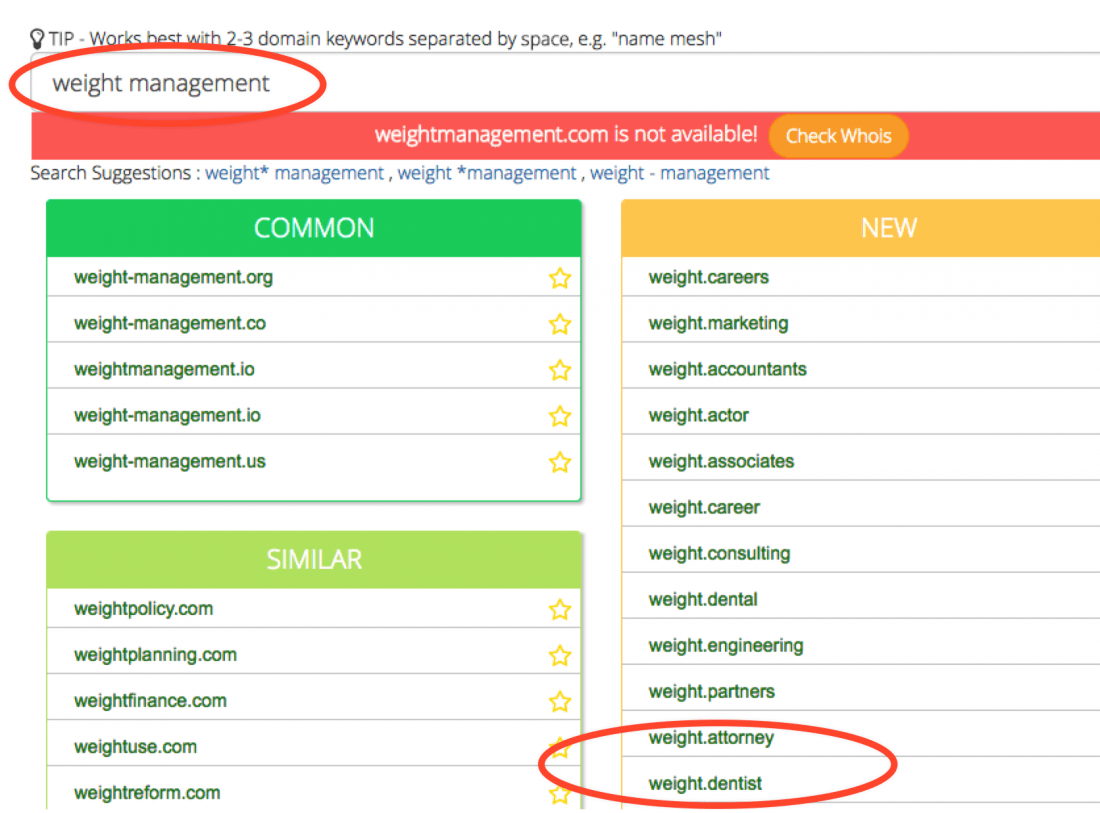
Thesaurus
If you need variations of a word, head over to Thesaurus.com. I know this sounds like a simplified solution, but wow do I love this tool. In fact, it’s one of my go-to’s daily.To use it for domain research, head over to Thesauras.com and type in the words that describe your business. We'll use the "weight management" example from above.Now let's think about the true intent of weight management. What do people really want to do? Manage their weight, right?So let's use the word "manage" to see what we come up with.
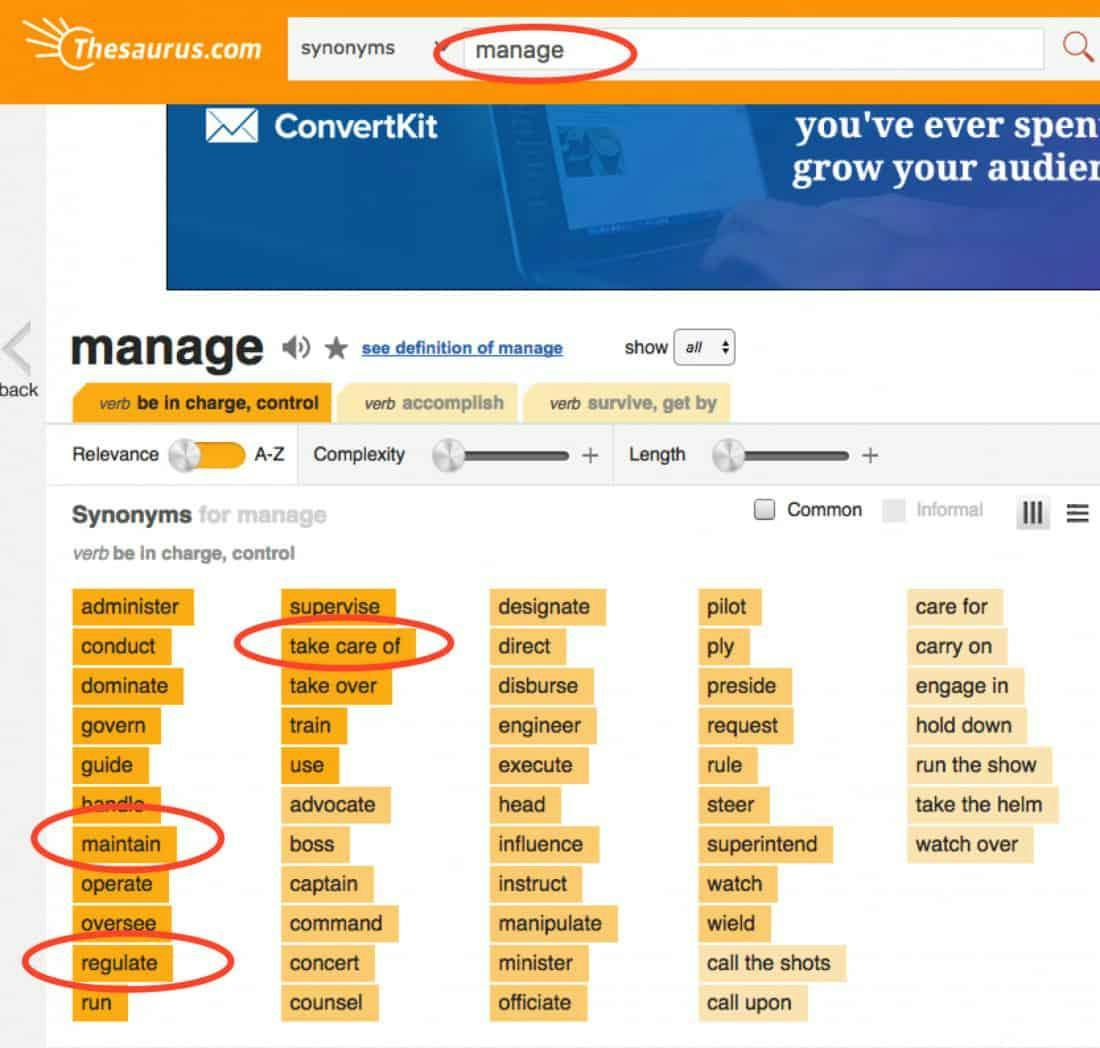
Your target market more than likely wants to maintain, regulate, or take care of a few extra pounds. Consider all of these words dependent on the focus of your blog and content.
CoolNameIdeas
If your brand or business name is already taken, use a tool like CoolNameIdeas.com to add words to the beginning or end of your domain.You can do this yourself by adding something relevant to create a phrase. For example, if your company name is “Amy’s Designs,” add another word that tells the same story - for example “theamydesigns” or “amydesignsco.”As you can see, the essence of your brand still remains and you keep it short and simple.
A Quick Recap:
SHORT: First, keep it short. Think of your favorite brands:
- Starbucks
- Audi
- Apple
Ok, maybe those are mine, but still… they make a point. Make sure your domain is short, and easy to remember with 2-3 words at the most.RELEVANT: Your domain must align with your business name, vision, and story.MEMORABLE: Share what’s unusual, striking or extraordinary about your business.
STEP 3. Set Up Your Blog
Hosting is your first big decision once you’ve landed on a domain name. It affects the speed, reliability, and professional appearance of your blog.While there’s hundreds of options to choose from, I personally recommend Hostgator.They’re simple to set up and integrated with top platforms like Wordpress. Plus, you don't need to be a techie or a developer to get started.Your content management system is equally important. Because of that, I only recommend Wordpress.WordPress has two versions, WordPress.org and WordPress.com. WordPress.org is the one I recommend.With it, you'll use your own branded domain and have complete control over the design and functionality of your blog.Here's how to get it set up with Hostgator:
STEP 4. Create Your Content Strategy
No matter your niche, you'll need to focus on delivering educational and informative content.Sure, GIF’s and Memes are popular, but is that really what you want to be known for? Probably not.Instead, elevate the conversation around your business.What struggle is your audience facing and what unique insight do you have to solve that issue?Anyone can Google and find an answer. Heck, I just Googled “how to know your niche” and came away with over 5 million results.That’s a lot of reading if I’m searching for the right answer.Your job is to understand what appeals to your audience and then deliver consistently.Sure, this might sound like an incredible amount of hard work to you. And I won’t lie. Creating quality content is a commitment. But, it doesn’t have to be difficult or scary.And the benefits far outweigh the amount of time put in.You'll build rapport with visitors, get the opportunity to convert them into contacts, and then have built the trust to turn them into lifelong customers.Take the steps below to get started with your content strategy.
A. Get to Know Your Target Market
Start by identifying how you’ll WIN by knowing your: Who, Issues, and Needs
- Who: Who will you be talking with on your blog? List your target market. Mine for example is small business owners, entrepreneurs, and marketers.
- Issues: What issues is your target market dealing with? Mine would be finding enough time to manage social media, juggling a business online and offline, budget, conversion, results.
- Needs: What are the needs of your target market? This is where you’ll start to identify opportunity. What problems can you solve and what solutions will you provide?
B. Identify the Type of Content You'll Write
What content do you currently have in place and what will you produce? To become a content marketing powerhouse, you have to write SHARE WORTHY content!
- Content That Educates
This is the number one content marketing choice for most B2B and B2C businesses.Have a long sales cycle? Educational content can walk your prospects through the consideration process.Share content that helps your readers evaluate their options. It should also elevate the experience around your business.
- Content That Entertains
People love entertainment. From Gifs to Memes, this type of content is heavily shared across social media.It usually involves videos, comic strips, images and webisodes. It's entertaining and visually appealing. It likable, shareable, and often the most engaging content on social media.
- Utility Content
Utility content helps your audience accomplish certain tasks, and make the right decisions. This type of content does not tell stories – it gives users tools to get from point A to B.Utility content is exactly what the user needs to make an educated and informed decision.So, which type of content sounds most appealing to your audience?Your goal is to choose one and create a unique piece of content that you'll share with your audience.
C. Create a Content Calendar
The key to every successful blog is consistency. Determine how often you’ll post and what days of the week you’ll publish new articles.An editorial calendar will keep you focused on your topic and posting on a regular schedule.Create a calendar and map out specific topics like:
- Company milestones
- Upcoming events
- Hot topics
- Industry news
- Core values
Don't want to build it out on your own? Grab a copy of our free calendar template.
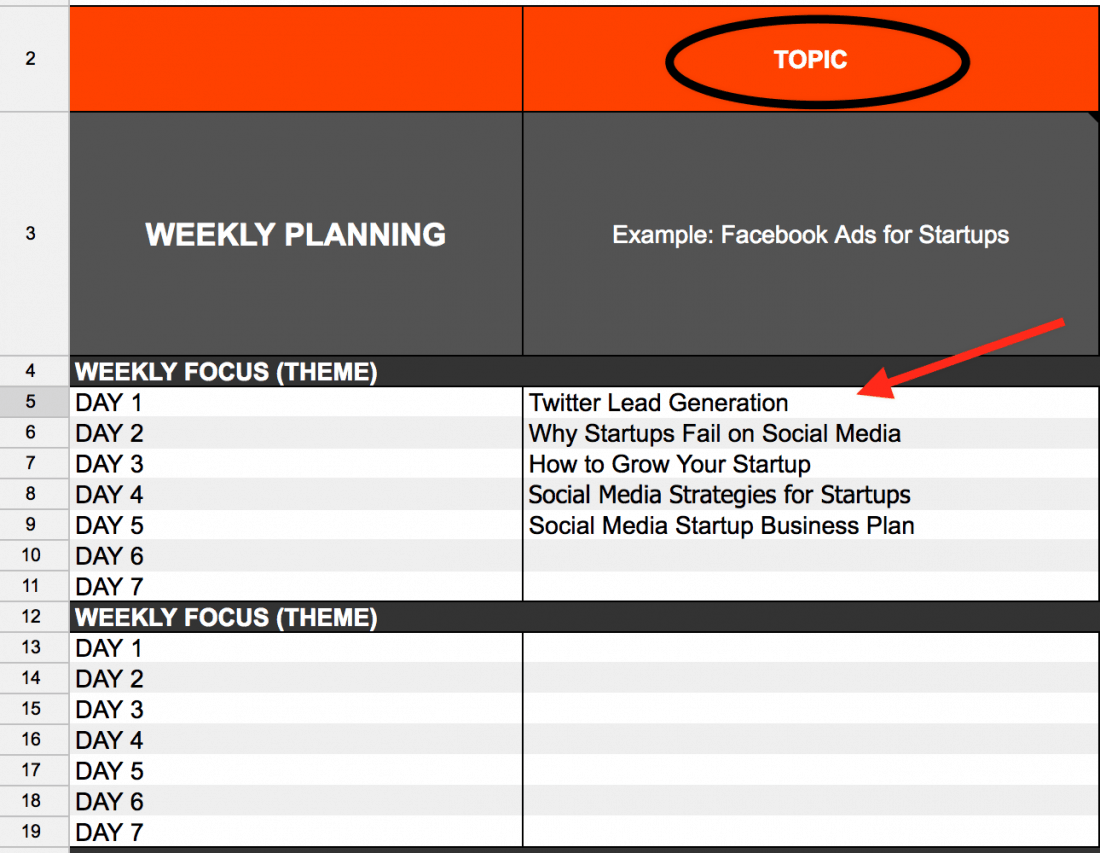
5. Network Through Blog Platforms
A big part of blog success is based on the relationships you create. One of the best ways to gain visibility is through blog promotional platforms.The idea is to join groups that have created Tribes of individuals who share the same interests. This means you're making targeted connections, as opposed to a scattershot approach.While blasting your content to as many people as possible might sound like a solid plan, don't do it.Put your content in the hands of people who care about your topic.Pick a handful of websites, Facebook Groups, and online forums designed to connect like-minded bloggers. Here's how I use one of my favorite tools to build awareness and authority.
Triberr
Tribber is a simple to use tool designed to connect bloggers with similar content creators. The key to success (as with any of these tools) is reciprocation.You add your blog content and then share other people's content your audience will enjoy.To get started:
- Create your account - you can connect via Facebook, Twitter or LinkedIn or create a login and password.
- Connect your blog - you can do this through RSS or if you're using Wordpress, download the Triberr plugin to automatically add your blog post.
- Join tribes - find tribes relevant to your industry or niche.
- Accept tribe invites - you'll also begin to receive invites to tribes. Accept those that make sense to the type of content you share.
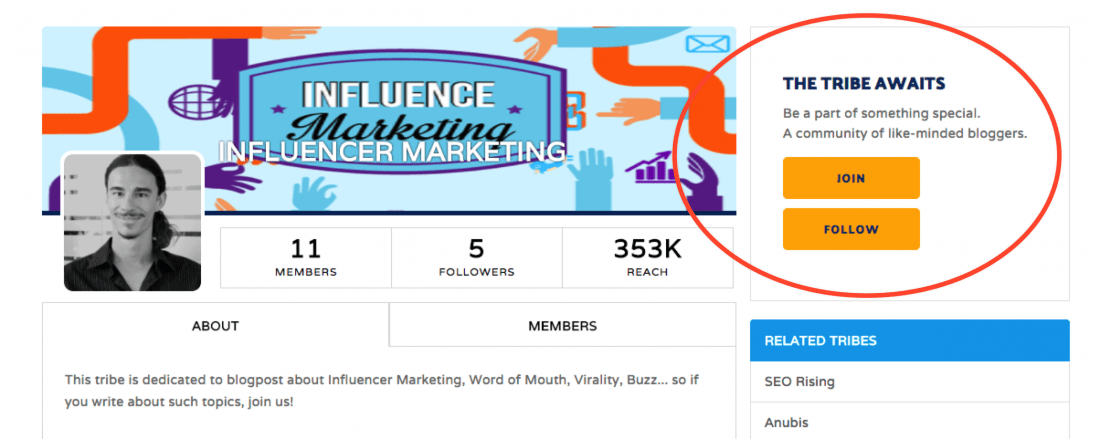
Take 5 minutes each day to find content, share it to Facebook, Twitter or LinkedIn, and begin a conversation as people share.
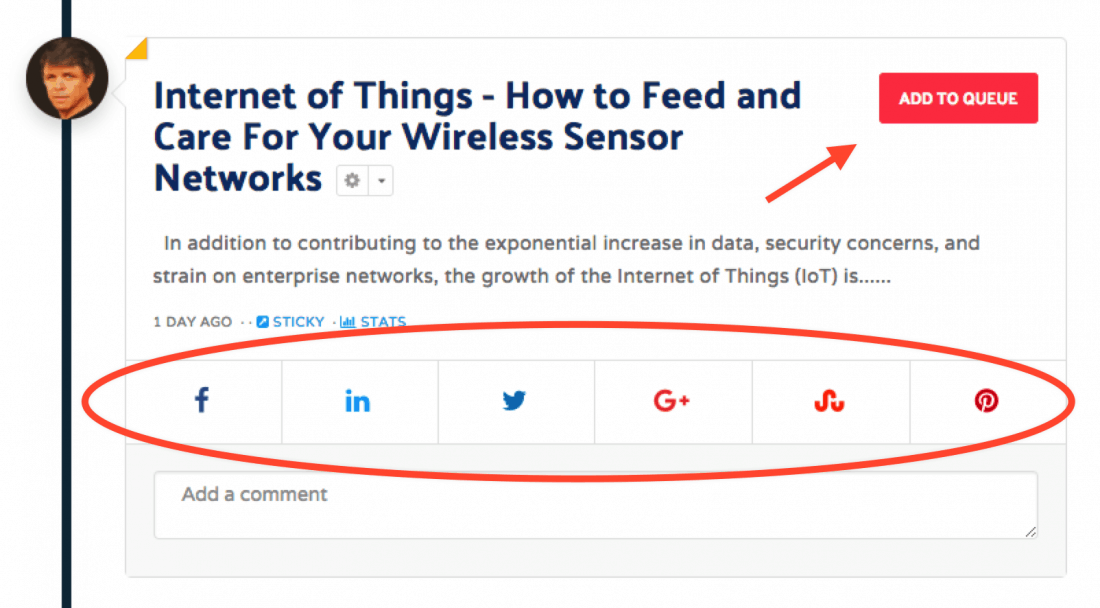
Additional Blog Platform Options:
6. Promote Your Blog Content
When it comes to promotion, you have multiple options. But when you're new to blogging, the cost effective ideas are the best.Especially when they're also going to give you the biggest results for your time.Over the years, I've tweaked my promotional strategy to find the perfect mix.Each one will help you increase conversation, shares, and traffic around your new site.
A. Influencer Outreach
Influencers are one of the most powerful marketing weapon you’ll ever wield.By joining forces with an influencer, someone with similar goal to yours, you gain their reach, which you can leverage to promote your blog post.Find influencers who have the right balance of reach and engagement. start-a-successful-blog-7-easy-stepsReach out in an authentic way. (no stock email please)Tell them what you appreciate about their content and why you'd like to partner.I find that the genuine approach is relatable and something most will respond to.
B. Social Network Specific
Twitter CardsWith Twitter Cards, you can attach rich photos, videos and media experience to Tweets and drive traffic to your website.Add a few lines of HTML to your webpage, and users who Tweet links to your content will have a “Card” added to the tweet.Pinterest Article Cards (Rich Pins)Pinterest Article Cards can dramatically improve the interest and click-through rate on your article pins.Your care will include the title, author's name, description and story link, right on the pin.Click to Tweet (CTT)Embed a click-to-tweet in your blog post and make it easier for the reader to share your blog on Twitter.Here's what one looks like:[clickToTweet tweet="Want to start a successful blog? Here's everything you need to know to create your blog today!" quote="Want to start a successful blog? Here's everything you need to know to create your blog today!"]
C. Bookmarking and Promotion Tools
7. Start an Email List Now
This final tip is one I can't stress enough. Too many newbie bloggers make the mistake of forgetting about list building until years later.While you can't turn back time, you can always get started today.Use tools like Constant Contact, AWeber and my personal favorite, Convert Kit. Then pair that with Wordpress plugins to create forms and build a targeted blog list.
Final Thoughts on Starting a Successful Blog
Successful blogs aren't born overnight. They take time and consistency.So be patient and write. Then write again, and again, and again.The more you write, hit that publish button, and stay focused on your cause... the quicker you lose the jitters, build in solid writing habits, and draw an audience eager to read your content.
QUICK START: Ready to start your blog? Watch my getting started guide to create your blog fast!
About Rebekah Radice
Rebekah Radice, co-founder of BRIL.LA, has traded narcissism for purpose. When not driving growth, you'll find her tricking family into thinking she's Emeril Lagasse - likely covered in marinara. The spotlight was fun, but impact is better. These days she's using 20+ years of brand brilliance for good.
